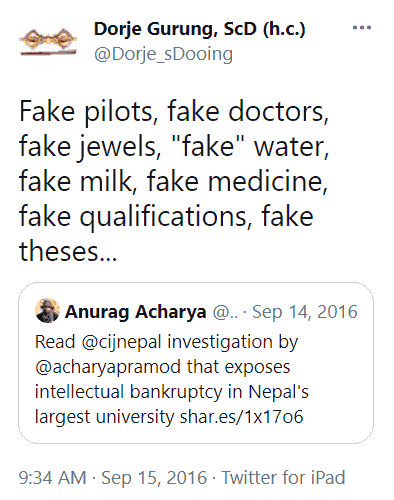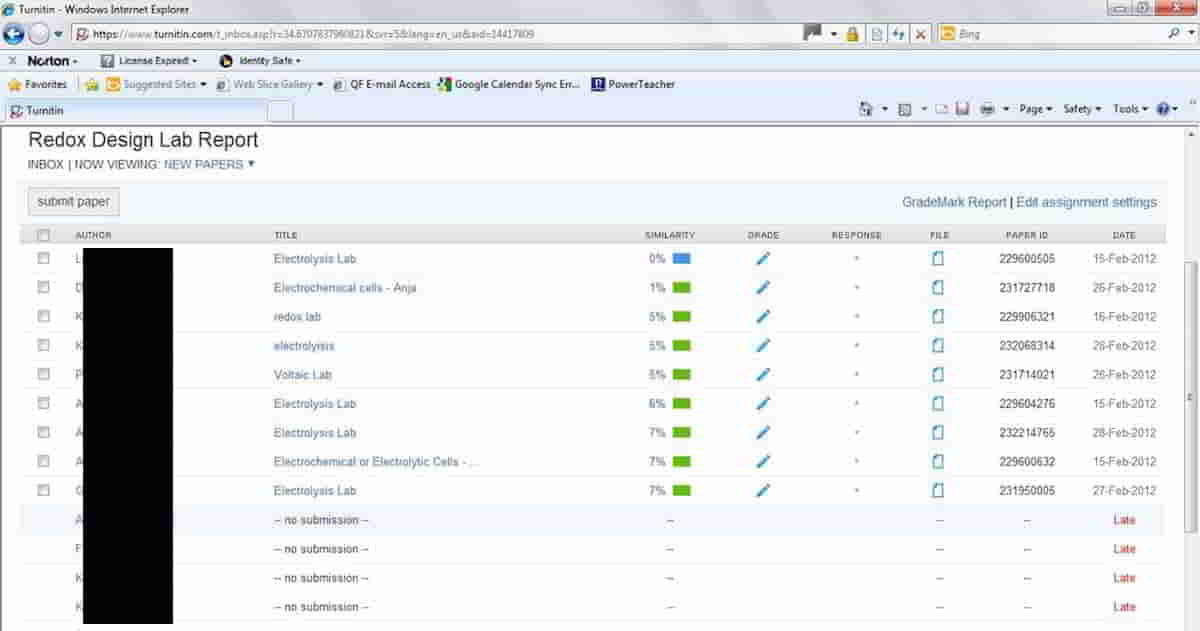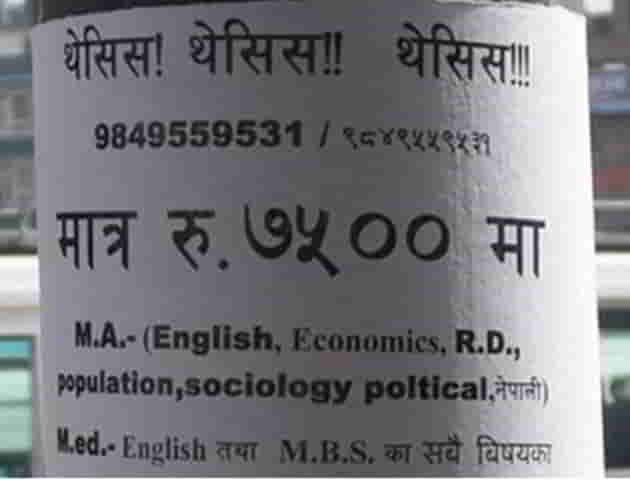
Nepal has always been really corrupt for as long as I can remember.
But when my international teaching career took me to Baku, Azerbaijan in 2007, I thought I had found a country more corrupt…not that I was looking.
One of my local colleagues at the school I was working was a full-time IT technician, who, of course, came to work every day, all day. But, he was also a “full-time” university student!
That, however, was nothing really surprising!
Long before my move to Baku, I had known about Nepalese friends and acquaintances being “full-time” university students in Kathmandu, hardly ever going to classes (attendance is a not mandatory), cramming before the examinations, showing up to the examinations, taking them, passing them, fulfilling other requirements (such as dissertation etc.) and getting their advanced degrees.
That, however, was not how university students in Baku — like my colleague and others — got their advanced qualifications! They got theirs by paying off their professors!
I was told even school students in Azerbaijan had to pay off their teachers to move up the grades! Part of the problem was that pretty much every educational institution in the country was public — owned and run by the State — and, like in most countries around the world, paid the teachers and professors peanuts.
The country however is wealthy; the boon and curse of oil (in the Caspian Sea) drives its economy. Its currency, the Manat, at the time, for instance, was stronger than the US Dollar!
But corruption and a dictatorship ensures the oil revenues do not benefit the people; a significant percentage of Azeris are poor!
I even remember conversations with friends and colleagues where we expressed horrors at the possibility of being treated by a doctor who could have literally bought their qualification!
Sure I was aware of the poor quality of education, of private school education being more a business, and of post-secondary and tertiary education being a black hole and really disorganized etc. in Nepal. But, as far as I knew, you still couldn’t BUY your qualifications! If you wanted to, Bihar, the neighboring Indian State to the South-east, was the place to get it from…or at least that’s what I had been led to believe way back in the nineties!
Little did I know!
Turns out, our institutions of higher education may have produced more charlatans!
Apparently authorities in #Nepal discovered a pilot with fake qualifications. What did he plan to do once inside a cockpit? Fly the plane?
— Dorje Gurung (@Dorje_sDooing) May 7, 2016
At least with fake pilot u could take consolation in that s/he wouldn’t b able to fly a plane! But doctors? #Nepal https://t.co/mgouLNgpHN
— Dorje Gurung (@Dorje_sDooing) June 19, 2016
“Fake” milk/water/taxi meter/medicine, fake gold/silver/driver’s license/teachers/pilots/docs. & now prizes! #Nepal https://t.co/FCEBxPMr8R
— Dorje Gurung (@Dorje_sDooing) June 24, 2016
#FakeDoctors, #FakePilots…”fake” police? #Nepal https://t.co/yzQaWk6Oqf
— Dorje Gurung (@Dorje_sDooing) September 20, 2016
Almost a month ago, the Center for Investigative Journalism brought out a damning investigative report. Turns out, two Universities in Kathmandu, and their affiliates, have been awarding Master’s Degrees to candidates based on recycled theses the students had — wait for it — bought!
Fake pilots, fake doctors, fake jewels, “fake” water, fake milk, fake medicine, fake qualifications, fake theses… https://t.co/fJmG1kJXPF
— Dorje Gurung (@Dorje_sDooing) September 15, 2016
Tribhuvan University (TU), established in 1959, is the oldest government (public) university of Nepal. Their website About page says:
TU has 7,966 teaching faculty and 72,30 non- teaching staff including the support staff in its constituent campuses. The total number of employees is 15,196 including 124 new posts of the Manmohan Cardiothorasic Centre.
I couldn’t find any reference to graduation numbers and/or rates anywhere on their website. Wikipedia entry for the University lists 604,437 as its student population. TU, in other words, is the biggest university in the country.
Similarly, Kathmandu University, a private university established in 1985, with 458 teaching and 725 non-teaching staff, and 15,000 students (according to wikipedia) is also big.
In spite of them being so big and well-established, the investigative reporter found evidence for plagiarized theses going as far back as 1985, when I was a ninth grader, long before I had heard about fake Bihari qualifications!
Here’s a video of the report, which is also embedded in the report. (It’s in Nepali with English subtitles.)
(You can find the Nepali version of the report here.)
The Solution
Of course online tools exist to check and curve plagiarism in academic work: it’s called TurnItIn.com.
Even as an international secondary school science teacher, I ran — on the site — plagiarism checks on assessed written work: essays and lab reports.
How it works is that your institution, for a fee, subscribes to it. The institution then creates teacher/instructor user accounts.
Once a teacher gets their account, they then create classes and add students to those classes. As and when the instructor wants to check assessed student work, they create that task for the class and asks the students to submit (in MS Word or PDF format) the work directly into site.
Then Turnitin.com produces a Similarity Report for them. It’s as simple as that!
Here’s a screen shot of a result of a lab report submission.

The Similarity Report (the third column) gives you a pretty good indication for whether the work is plagiarized. Clicking on it gets you considerably more details — such as the identities of the works its similar to, texts that matched etc. It’s up to the instructor/teacher to decide whether the level of similarity is acceptable, i.e. whether the work is indeed plagiarized!
Accuracy increases with number of submissions. If TU and KU used this tool, as more theses are submitted, the more readily Turnitin.com would be able to identify plagiarized ones.
That neither TU nor KU — as big as they are — made use of such tools came as a shock to me, of course!
Maybe the lucrative nature of the buying-and-selling of theses trumped everything else! After all, everyone — from the students, the shop owners, the ghost thesis writers to the thesis supervisors — appeared to have benefited from it! Who would want to kill their golden goose?!
Recent reports in Kantipur and MyRepublica say that TU has formed a committee to look into the controversy and formulate new rules and policies to combat the problem. I have yet to see any response from KU though.
(But within a week of those reports, another article came out citing irregularities in TU professors supervising research of Nepalese PhD students enrolled in foreign universities and awarding doctorate.)
I have said this before (here, here and here) and I’ll say it again: our political leaders are completely and totally morally bankrupt.
I was saddened to learn of another bankruptcy: the intellectual bankruptcy of our institutions of higher learning.
The pursuit of knowledge, to me, is one of the purest and most unadulterated endeavors. But, even in as noble a pursuit as the acquisition of extensive and in-depth knowledge (and skills), what appears to matter, at the two premier institutions of tertiary education in the country, is the bottom line.
Is there anything in #Nepal that is not for sale? Is there anything in Nepal that money can’t buy?
I really want to know!
— Dorje Gurung (@Dorje_sDooing) September 29, 2016
Looks like I had been under the wrong impression about our education system all these years. We appear to be no better than Azerbaijan or Bihar!
So I have to ask again, is anything — really ANYTHING — sacrosanct in this country?
July 20, 2017 Update
Just the other day, I came across an article in My Republica, published on June 14, about TU’s plans to buy plagiarism checking tools. (The article was also reproduced by GadgetbyteNepal.com.) At least they are trying to do something!
Jan. 30, 2020 Update
Received this some time ago from a friend. The top lines says, “Theses! Theses!! Theses!!!” The middle line reads, “For only Rs. 7500”. That’s approximately USD73.
* * * * * * * *
References:
MyRepublica (June 19, 2016). 36 ‘fake’ doctors arrested (with names).
The Kathmandu Post (June 20, 2016): 36 fake docs in CIB net
Setopati (June 20, 2016). 36 fake doctors made public
The Big Story (June 20, 2016). Dozens of Nepal docs arrested for allegedly false papers
The Himalayan (Aug. 9, 2016). CIB arrests doctors with fake credentials
Glocal Khabar. NMC to probe intermediate certificates of all 16,000 docs in Nepal
CIJ (Sept. 14, 2016). Theses on Sale
PahiloPost (Sept. 14, 2016). बौद्धिक चोरी : पैसा तिर्नुस्, थेसिस किन्नुस्
TurnItIn. Turn It In.
Kantipur (Sept. 23, 2016). त्रिविले ‘थेसिस’ विकृति रोक्ने
MyRepublica (Oct. 7, 2016). TU forms committee to study thesis controversy
Nagariknews (Sept. 28, 2016). बढुवा लोभमा अनधिकृत विद्यावारिधि.
Saikshikaviyan (Sept. 28, 2016). बढुवा हुने लोभमा नक्कली विद्यावारिधि लिँदै त्रिविका प्राध्यापकहरु
MyRepublica (March 1, 2018). TU is dead. TU is Tribhuvan University, the country’s oldest university. “Our university has degenerated into an intellectually dead institution. If it had been kept away from baneful politics, it would not have been so.”[…]”Critical thinking is a key to intellectual growth of a university. Only professors inclined to critical thinking are capable of propounding new theories. It is very difficult to find such professors at TU. Mostly TU professors are either disinclined to think critically or incapable of doing so. Blatant political interference has turned the exam conducted by TU Service Commission into a charade. As a result, those who do not deserve to be a professor become professors.” [Added on March 6, 2018.]
Nonstop Khabar (June 25, 2017). Thesis On Sale ! [Added on Dec. 31, 2020.]
Shilapatra (March 29, 2021). बौद्धिक चोरी गर्ने सात प्राध्यापकलाई त्रिविले गर्यो कारबाही, २ वर्षसम्म कक्षा सञ्चालनमा रोक. (Seven Professors Sanctioned by Tribhuwan University Over Plagiarism: Banned from Teaching for Two Years). [Added on March 30, 2021.]
Himalkhabar (April 14, 2021). बौद्धिक चोरी गरेर कहिलेसम्म विद्वान् कहलिने? (For How Long Do We Want To Pass as Educated Through Plagiarism?) [Added April 15, 2021.]
The Himalayan (July 30, 2018), Three pharmacy operators held for selling fake life-saving drugs. [Added on July 15, 2021.]
Kantipur (July 31, 2018). जोशी एसएलसी फेल, संसदीय समितिमा बुझाएको प्रमाणपत्र नै झुटो According to the article, high school diploma (SLC) certificate of candidate for Chief Justice of the supreme court is fake — he failed the examination! And all these years he has been a judge! Worse, a member of the Parliamentary Hearing Committee (PHC) set up to decide on fate of the candidate’s nomination to the SC has has received death threats against rejecting the nomination.[Added on July 15, 2021.]
NgarikNews (July 14, 2021). विराटनगरका फार्मेसीमा नक्कली औषधि, तीन पक्राउ Article about fake medicine. [Added on July 15, 2021.]
KathmanduPati (Nov. 18, 2018). सेनामा शैक्षिक प्रमाणपत्रको छानविनः जर्नेल नै बुझाउंदै राजीनामा Army personnel with fake qualifications and faked birth dates. [Added on July 15, 2021.]
Kantipur (April 21, 2021). नक्कली पीसीआर रिपोर्ट बोकेका १ सय ७२ यात्रु विमानस्थलमा पक्राउ Fake PCR tests. Article about the same issue but in English. [Added July 15, 2021.]
OnlineKhabar (Jan 25, 2017). बिजुलीको मिटर बिगार्ने कर्मचारी भन्छन्ः कति बिगारियो सम्झना नै छैन “Fake” electricity meter. [Added July 15, 2021.]
NayaPatrika (Nov. 2, 2018). १५ सय कर्मचारीको शैक्षिक प्रमाणपत्र छानबिनमा, २ महिनामा २१ विरुद्ध मुद्दा Over 15K civil servants being investigated for possibly holding fake qualifications. It is estimated that “minimum 4-5 thousand” civil servants hold fake qualifications! [Added on July 15, 2021.]
NayaPatrika (Nov. 2, 2018). काठमाडौंमै नक्कली स्याम्पु र मसला उत्पादन (Fake shampoo and curry powder mix in Kathmandu). [Added July 15, 2021.]
Nagarik (July 14, 2021). ६७ करोडको राजस्व छली “Fake” VAT bills. [Added on July 15, 2021.]

